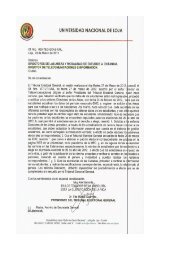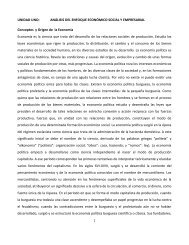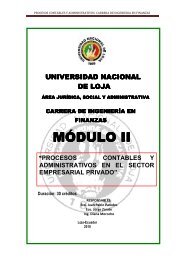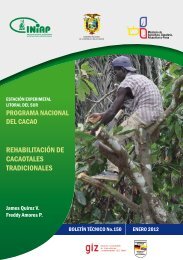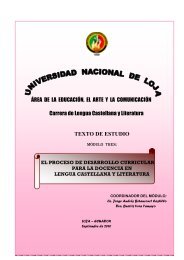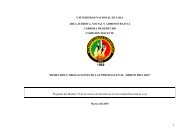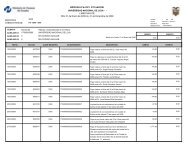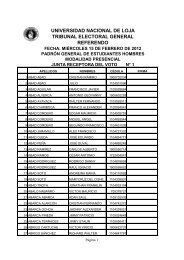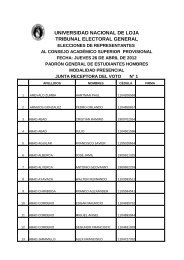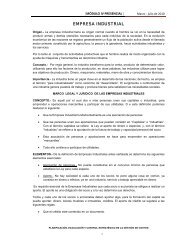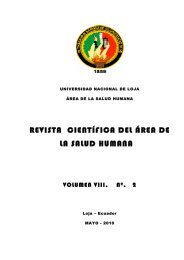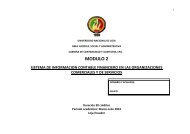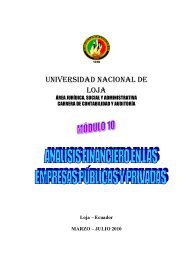module 5 planning of the english language teaching-learning process
module 5 planning of the english language teaching-learning process
module 5 planning of the english language teaching-learning process
Create successful ePaper yourself
Turn your PDF publications into a flip-book with our unique Google optimized e-Paper software.
UNIVERSIDAD NACIONAL DE LOJA<br />
Área de la Educación el Arte y la Comunicación<br />
English Language Career<br />
Think <strong>of</strong> three comments you <strong>of</strong>ten give to your learners as feedback. What do<br />
<strong>the</strong>y focus on? Why do you give <strong>the</strong>m?<br />
Here are some examples <strong>of</strong> teacher feedback to learners.<br />
Example Focus Purpose<br />
Oral: 'Well done. This is much better.'<br />
Oral: 'Have ano<strong>the</strong>r look at number<br />
four. There's a problem with spelling<br />
and I think <strong>the</strong>re are more than two<br />
people.'<br />
Oral: 'Let's look at <strong>the</strong> new structure on<br />
<strong>the</strong> board again. I think some <strong>of</strong> you<br />
have misunderstood how we use it.'<br />
Written: 'What an amazing story! You've<br />
used adjectives very well this time. Your<br />
work is much better this time. You have<br />
tried very hard.'<br />
Oral: 'You've made good progress in all<br />
your work this month. Your written work<br />
is much more accurate.'<br />
Written: 'B / 70%. Have a look at<br />
grammar section 5 at <strong>the</strong> back <strong>of</strong> <strong>the</strong><br />
coursebook and check again <strong>the</strong><br />
difference in meaning between <strong>the</strong> past<br />
simple and <strong>the</strong> past perfect.'<br />
Oral: 'You all did <strong>the</strong> pairwork activity<br />
quite well but 1 heard too much<br />
Spanish and not enough English.'<br />
Progress,<br />
<strong>language</strong> and<br />
ideas<br />
Language and<br />
ideas<br />
Language<br />
Ideas,<br />
<strong>language</strong>,<br />
attitude and<br />
progress<br />
Language and<br />
progress<br />
Language<br />
Language,<br />
ideas and<br />
behaviour<br />
Praising <strong>the</strong> learner and telling her<br />
she is doing well; encouragement.<br />
Telling <strong>the</strong> learner <strong>the</strong>re is a<br />
problem with one <strong>of</strong> <strong>the</strong> answers<br />
and that she needs to look at it<br />
again.<br />
Inviting learners to look again at<br />
<strong>language</strong> that <strong>the</strong>y are having<br />
problems with.<br />
Praising <strong>the</strong> learner on her good<br />
level <strong>of</strong> work, and <strong>the</strong> effort she has<br />
made and in particular on one part<br />
<strong>of</strong> her writing (adjectives).<br />
Informing <strong>the</strong> learner <strong>of</strong> her<br />
progress; encouragement.<br />
Giving a grade and informing <strong>the</strong><br />
learner <strong>of</strong> what <strong>the</strong> problem was<br />
with her work and telling her exactly<br />
what she needs to review and how.<br />
Encouraging learners but also<br />
informing <strong>the</strong>m that <strong>the</strong>y did not<br />
behave appropriately during<br />
pairwork.<br />
We can give feedback to individual learners (individual feedback) or groups <strong>of</strong><br />
learners (group feedback). When learners give feedback to one ano<strong>the</strong>r, this is<br />
called peer feedback. Feedback can be oral or written.<br />
Feedback can be linked to formal or informal assessment and can be given to<br />
learners in <strong>the</strong> classroom or during individual meetings. We can also write<br />
regular feedback in <strong>the</strong> form <strong>of</strong> comments, grades or marks on a learner's<br />
record sheet. The learner can keep this sheet in <strong>the</strong>ir portfolio or we might keep<br />
it with our records <strong>of</strong> <strong>the</strong>ir overall progress and achievement. We can use this<br />
feedback when we make our end-<strong>of</strong>-course assessment.<br />
Peer feedback is useful for all learners. The learners who give <strong>the</strong> feedback<br />
reflect on <strong>the</strong> work <strong>the</strong>ir classmates have done. The learners who receive<br />
feedback are given information on how <strong>the</strong>y can improve. The learners are<br />
<strong>of</strong>ten guided by a feedback observation sheet. Young learners, though, are not<br />
[Escribir texto] Página 111



